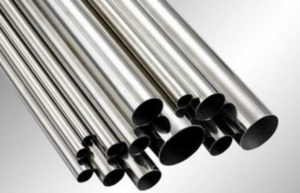201 stainless steel, the name may sound unfamiliar, but it is ubiquitous in our daily lives. So, what is 201 stainless steel? Why is it so important? In this post, let’s uncover its mysterious veil together.

What is 201 stainless steel?
It is a versatile alloy that belongs to the austenitic series, which means it contains high levels of chromium and nickel. This special grade of stainless steel is widely used in various applications due to its excellent corrosion resistance and durability.
One significant feature of 201 stainless steel is its low carbon content, which makes it less prone to carbon precipitation during welding or exposure to high temperatures. Therefore, compared to other types of stainless steel, this alloy has better formability and weldability.
In terms of composition, it typically contains about 16-18% chromium, 3.5-5.5% nickel, and up to 0.08% carbon. These elements work together to enhance the strength and rust or oxidation resistance of the material.
In addition, the presence of a small amount of manganese helps prevent phase transformation, thereby stabilizing the austenitic structure at lower temperatures – an important factor in maintaining the overall integrity of the material.
With its unique chemical composition mixture, it provides a cost-effective option for manufacturers and consumers, with impressive mechanical properties while maintaining good magnetic properties for some applications.
Magnetism of 201 Stainless Steel
The magnetism of 201 stainless steel is a topic of interest to many people. Unlike other types of stainless steel, such as the commonly used 304 or 316 grades, which are non-magnetic, 201 stainless steel does possess magnetism.
This is due to the composition of the alloy. In addition to containing iron and chromium like other stainless steels, it also contains manganese and nitrogen. These additional elements contribute to its magnetism.
It’s important to note that the magnetism of 201 stainless steel is not as strong as that of ordinary carbon steel. Its magnetic permeability is lower compared to materials like iron or nickel.
The magnetism of 201 stainless steel can be useful in certain applications. For example, it allows manufacturers to more easily classify and separate different types of scrap metal during recycling.
However, this magnetism can also have drawbacks in some cases. If you use magnets for storage or organization in the kitchen or workshop, items made from 201 stainless steel may accidentally stick to the magnets.
Although most stainless steels are non-magnetic, 201 stainless steel exhibits some degree of magnetism due to its unique composition. The level of magnetism may vary depending on factors such as heat treatment and surface finish.
Advantages of 201 Stainless Steel
It has a range of advantages that make it a popular choice for various industries. One of the main advantages is its excellent corrosion resistance, which allows it to withstand harsh environments and prolonged exposure to moisture or chemicals. This makes it well-suited for marine applications and kitchen utensils that may come into contact with water and food.
Another advantage of 201 stainless steel is its high strength-to-weight ratio. Despite being lightweight, this material has impressive tensile strength and yield strength, making it suitable for structural applications such as building exteriors or automotive components. It also has good heat resistance, maintaining strength even at high temperatures.
In addition, it has good formability, meaning it can be easily shaped and manufactured into different structures or products. This versatility makes it an attractive choice for manufacturers who need design flexibility.
Apart from these advantages, it is also known for its cost-efficiency compared to other types of stainless steel like 304 or 316. Its lower nickel content helps to reduce the price while still maintaining satisfactory performance in many applications.
The advantages of using 201 stainless steel include excellent corrosion resistance, high strength-to-weight ratio, good heat resistance, versatile formability, and cost-efficiency – all contributing to its widespread use in various industries.
Why Choose Sino Stainless Steel?
Thank you for reading our article and we hope it can help you to have a better understanding of 201 stainless steel. If you are looking for suppliers and manufacturers of 201 Stainless Steel, we’d advise you to visit Sino Stainless Steel.
As a leading supplier of stainless steel products across the world, Sino Stainless Steel provides customers with high-quality Stainless Steel Angles, Stainless Steel Channels, 201 Stainless Steel Strips & 304 Stainless Steel Strips, 310S Stainless Steel, 316 and 316L Stainless Steel, Stainless Steel Hexagon Bars, Hot-rolled Stainless Steel, Colored Stainless Steel Sheets, Stainless Steel Perforated Sheets, Cold-rolled Precision Stainless Steel, Stainless Steel Wire, and Embossed Stainless Steel Plates.
 :+86-13012867759
:+86-13012867759  :export86@sino-stainless-steel.com
:export86@sino-stainless-steel.com
In practice, Bodybuilders seem to offer conflicting conclusions of their results using bodybuilding peptides and research chemicals clomid medicine where to buy